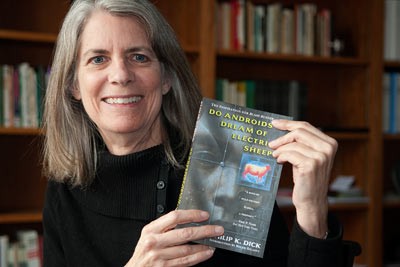Reading Project takes on the future of humanity with Philip K. Dick novel 'Do Androids Dream of Electric Sheep?'
By Daniel Aloi
The Cornell community takes a leap into the future with the 2010 New Student Reading Project, which will focus on Philip K. Dick's 1968 science fiction novel, "Do Androids Dream of Electric Sheep?" -- the basis for Ridley Scott's 1982 film "Blade Runner" and an influential work of post-apocalyptic fiction.
"[The book] generates a range of engaging topics for discussion and exploration, including technology, artificial intelligence, the environment, the future, the human, the real (as opposed to the artificial), the idea of design or creation, the status of art and the ineluctable force of entropy," wrote Laura Brown, vice provost for undergraduate education, in a letter to deans and vice provosts announcing the selection.
"It's definitely a classic of a sort," Brown said in an interview. "It's a popular classic, but Dick is not a popular writer who's been dismissed as too mainstream. There have been books written about him. He may seem like a popular writer, but he's attracted the attention of the deepest thinkers."
Dick, who died in 1982, has attracted international scholarly interest from literary and cultural critics, Brown noted, including critical theorist Fredric Jameson -- who has called Dick "the Shakespeare of science fiction" and featured "Do Androids Dream of Electric Sheep?" in his seminal 1971 study "Postmodernism."
"We really chose the book because of the way it engages a range of very contemporary issues that a majority of the students we're trying to reach are connected with," she said.
The book will be read by the incoming freshman class and new transfer students, and by faculty and staff leading discussions during student orientation in late August.
Instead of the traditional panel discussion in Barton Hall, Brown said, "we're going to stage five separate presentations, with the audience sufficiently mixed from across all the colleges, and assign to each one a different theme."
Speakers will address topics and themes related to the book, such as:
"We're trying to create more opportunities in these smaller venues for students to ask questions and to engage with the presenters and one another," Brown said. "We are looking for scholars and researchers in a range of different areas. The goal is to have the presentations be very different from one another and to display something of the range of intellectual and academic experiences that Cornell has to offer."
Jeff Hancock, associate professor of communication, will be one of the presenters.
"I think it's an inspired choice," he said of the book. "'Blade Runner' is probably one of my top three favorite films. In the book, they have to use technology to tell if someone is a human or an android. These sort of things are already here now. We can use technology to tell a lot of things about people -- their personality, whether they're part of the 'in' group or the 'out' group, whether they're lying, whether they're depressed."
Hancock's research focuses on human social interactions mediated by information and communication technology.
"Androids are with us now in the form of avatars," he said. "So while Dick's embodied androids aren't here in the mainstream yet, they certainly are in the form of disembodied virtual agents, such as in Second Life. The future in a way is here, and we need to be thinking about our behaviors in digital spaces. It has a lot of implications for ethics and for student behavior -- and the idea that whatever you do online leaves traces."
As in previous years, small discussion groups of about 10-15 students each, with faculty and staff facilitators will meet across campus the following day.
"It will give students two different kinds of experiences," Brown said. "From close readings of the book itself, to investigations of larger questions about the topics and disciplines that the book engages with. I'm guessing that the various presentations that we are planning will make the small group discussions more lively."
About 50 fiction titles -- recommended by faculty, staff and several student groups, including Meinig Scholars, resident advisers and Orientation leaders -- were considered for the 2010 project. Other books shortlisted for this year were "Timbuktu" by Paul Auster; "Little Black Book of Stories" by A.S. Byatt; and "Slaughterhouse-Five" by Kurt Vonnegut Jr. '44.
The reading project will be supported by a Web site, http://reading.cornell.edu, with a blog providing background, context and further resources to explore.
Media Contact
Get Cornell news delivered right to your inbox.
Subscribe